Social media trends change fast.

Consider, for example, how a few years ago, influencer marketing was a new and intimidating concept for many marketers.
Fast-forward to 2023, and 81% of social media marketers say most companies will have an influencer as the face of their brand this year.
A few other major trend-shifts: Building an active online community is now a critical component of a strong social strategy; social media is becoming the preferred channel for customer service; and funny and relatable content wins over more polished posts.
Here, let’s explore the 8 top data-backed recommendations for social media marketers to leverage in 2023 to continue to grow their audiences, increase customer loyalty and engagement, and achieve higher ROI.
*The following data comes from HubSpot Blog Research’s forthcoming State of Social Media Trends report, as well as HubSpot Blog Research’s State of Consumer Trends.
![Download Now: Social Media Trends in 2022 [Free Report]](https://no-cache.hubspot.com/cta/default/53/3dc1dfd9-2cb4-4498-8c57-19dbb5671820.png)
8 Data-Backed Recommendations for Social Media Marketers in 2023
1. Create a strong social media community.
A whopping 90% of social media marketers say building an active online community is crucial to a successful social media strategy in 2023.
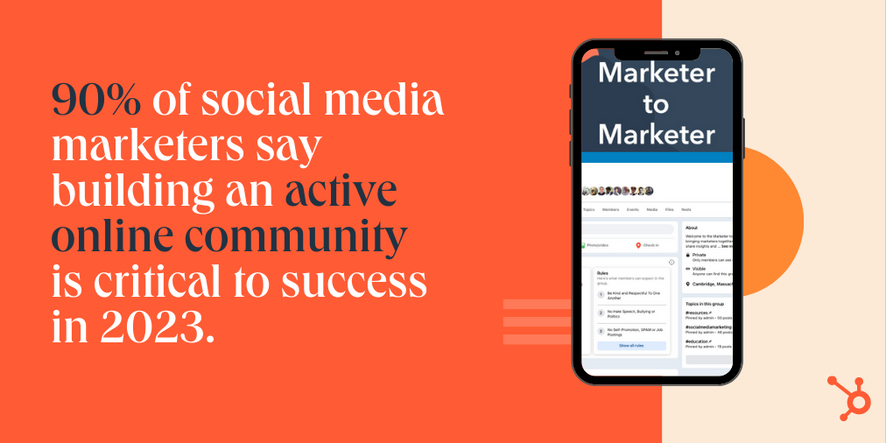
Online communities can help you cultivate stronger relationships with your prospects and customers, and ultimately deliver more value. They enable your audience members to connect with each other and share tips related to your industry, and help showcase your brand as a leader in the space.
Social media communities are on the rise: Over the past three months alone, 20% of social media users joined an online community, while 22% actively participated in one.
If you’re interested in creating a strong community in 2023, consider leveraging either Facebook or Instagram, which are tied at #1 for the most effective platform for building a social media community.
Additionally, check out Why the HubSpot Social Team Developed a Private Facebook Group for more step-by-step instructions on how to successfully launch a Facebook Group.
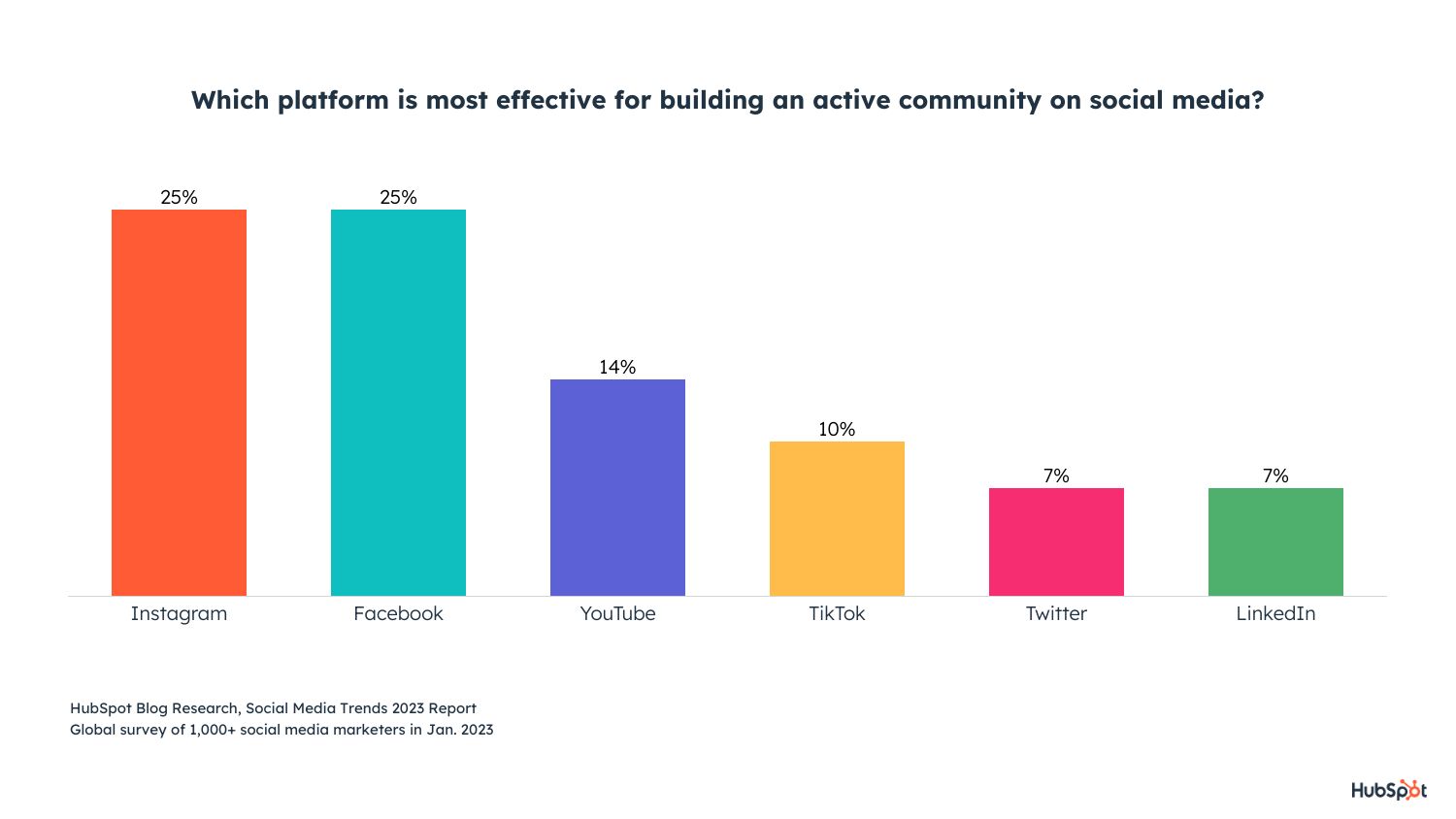
[COMING FEBRUARY 6] The State of Social Media in 2023: Click Here to Set a Google Calendar Reminder
2. Leverage social media as an e-commerce platform.
Social media is quickly becoming an e-commerce platform with all the capabilities to purchase products or services directly in-app.
for instance, 25% of social media users age 18-44 have bought a product on a social app in the past three months — and social is the preferred product discovery channel for consumers ages 18-44.
This trend isn’t going anywhere, and will likely become increasingly popular in the new year. Roughly 80% of social media marketers even predict consumers will buy products directly in social apps more often than on brands’ websites or third-party websites like Amazon in 2023.
The biggest inhibitor to social selling is a lack of trust. Only 21% of social media users rate products sold in-app as high quality, and only 42% of social media users feel comfortable making purchases on social media platforms.
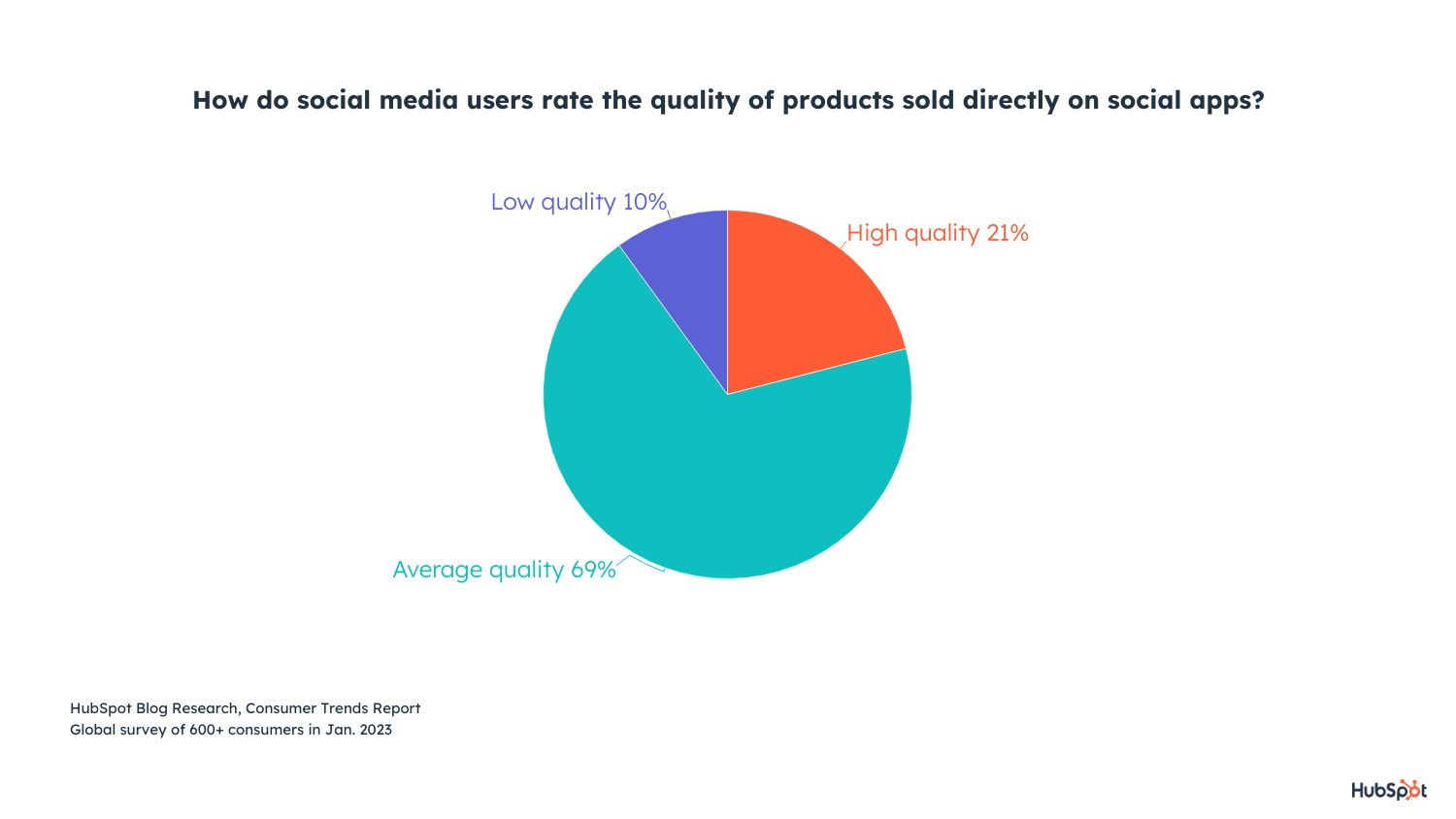
If you work at an e-commerce company, it’s vital you launch shopping features so followers can easily purchase your products without leaving the app.
Plus, to build trust with your audience so they’re more likely to purchase in-app, you’ll want to leverage the power of customer reviews. Alternatively, working with an influencer can help you build trust between their loyal following and your brand.
3. Build a customer service strategy for social.
Rather than calling and getting put on hold for a customer service representative, many consumers these days prefer to get their questions or concerns answered on social media.
Social media is quickly becoming a customer service tool. In fact, roughly 85% of social media marketers say social media will become consumers’ preferred channel for customer service in 2023.
A few quick stats:
- 1 in 5 social media users ages 18-44 have contacted a brand through DMs for customer service in the past three months.
- 42% of social media marketers list providing customer service through DMs as a primary responsibility of their job.
- 75% of social media marketers say their company offers customer service via social.
It’s vital that your company offers customer service on the platform(s) your consumers frequent and prefer. To incorporate a customer service process into your social strategy, you’ll want to run an audit to figure out where your customers are, set up monitoring streams, keep an eye on mentions, and build a system to get questions answered quickly.
You’ll also want to consider setting up a dedicated social channel for support.
Additionally, you’ll need to identify which employees should respond to customers’ queries. Right now, 43% of companies providing customer service through DMs have a customer service representative responding to customers, while 41% leave it to the marketer in charge of managing that platform. Another 13% use automation tools like chatbots.
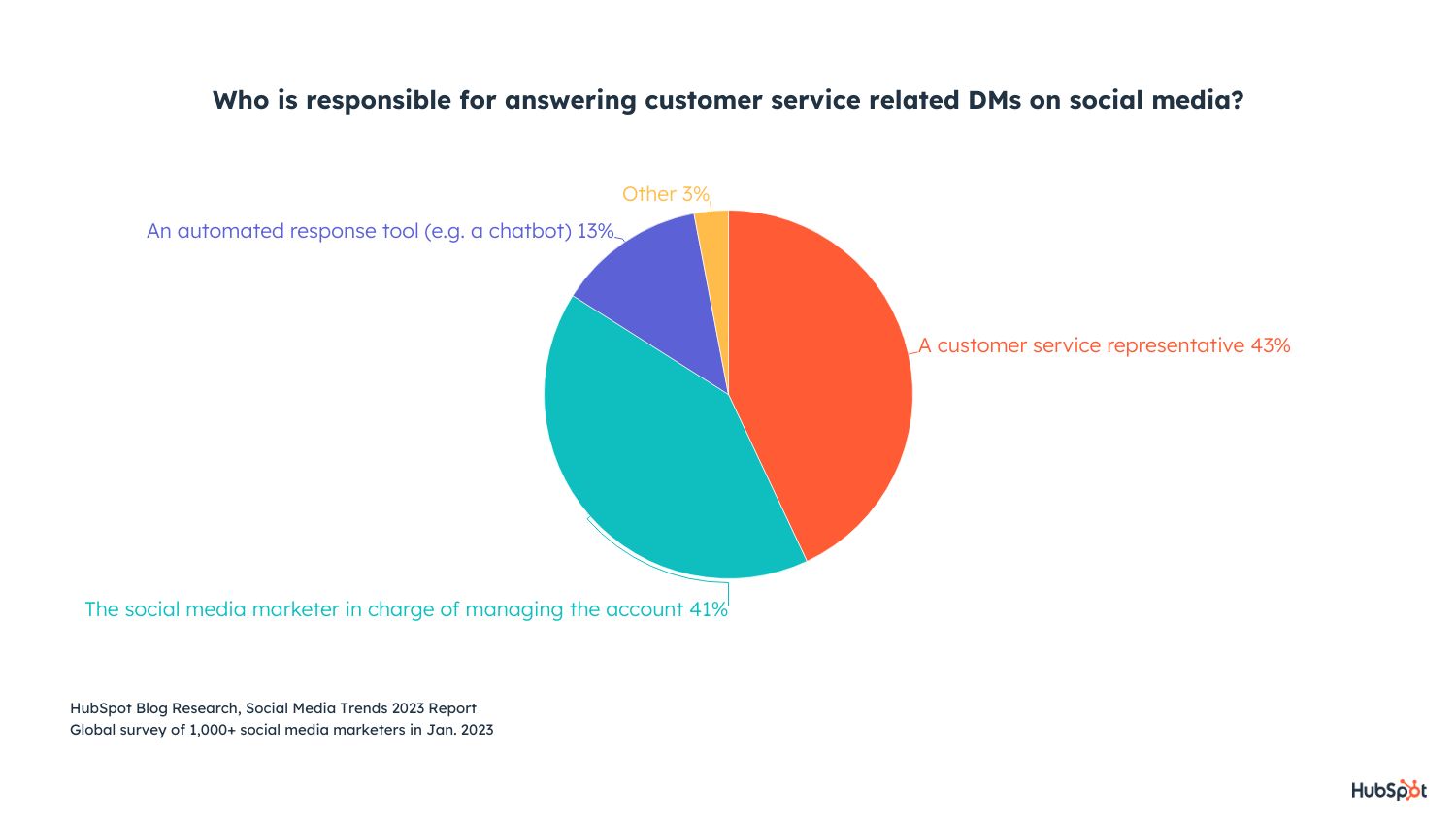
4. Shift your focus from search engines to social search.
A couple of years ago, marketers were largely focused on SEO as the primary marketing strategy for generating leads.
Nowadays, things have changed. almost 90% of social media marketers think consumers will search for brands on social media more often than through search engines in 2023.
I’m guilty of this: When I hear about a new skincare line, for instance, I don’t Google the brand — I find their Instagram page.
And I’m not alone. 22% of millennial consumers already search for brands on social media platforms more often than through a search engine. This shoots up to 36% among Gen Z.
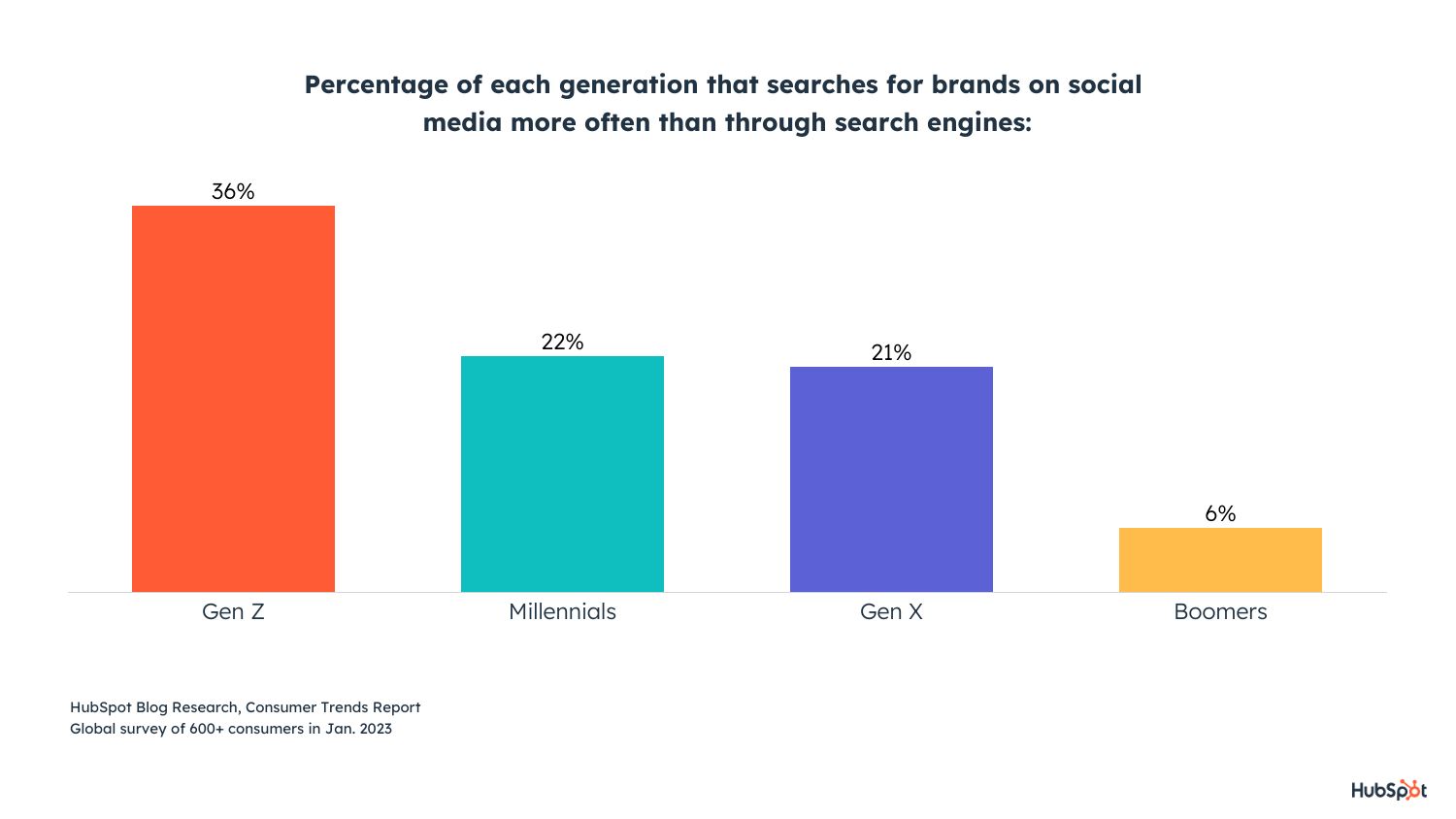
It’s critical, then, that you shift your efforts to focus on optimizing your profiles for social search. A few strategies for optimizing your profiles include using relevant keywords and hashtags in your posts and in your bio, making sure your username is easy to search for, and ensuring your usernames are consistent across accounts.
5. Ditch the celebrities — and focus on the micro-influencers.
If your business has the means, it can be compelling to work with a major celebrity to reach a large following — but it’s not necessarily the best strategy for high ROI.
Compared to celebrities, working with micro-influencers is less expensive, easier to establish long-term partnerships, and offers access to a micro-influencers’ tight-knit, engaged, loyal community.
Which is why 80% of influencer marketers work with small creators (1K to 99,999 followers/subscribers), while only 16% work with accounts over 1 million followers.
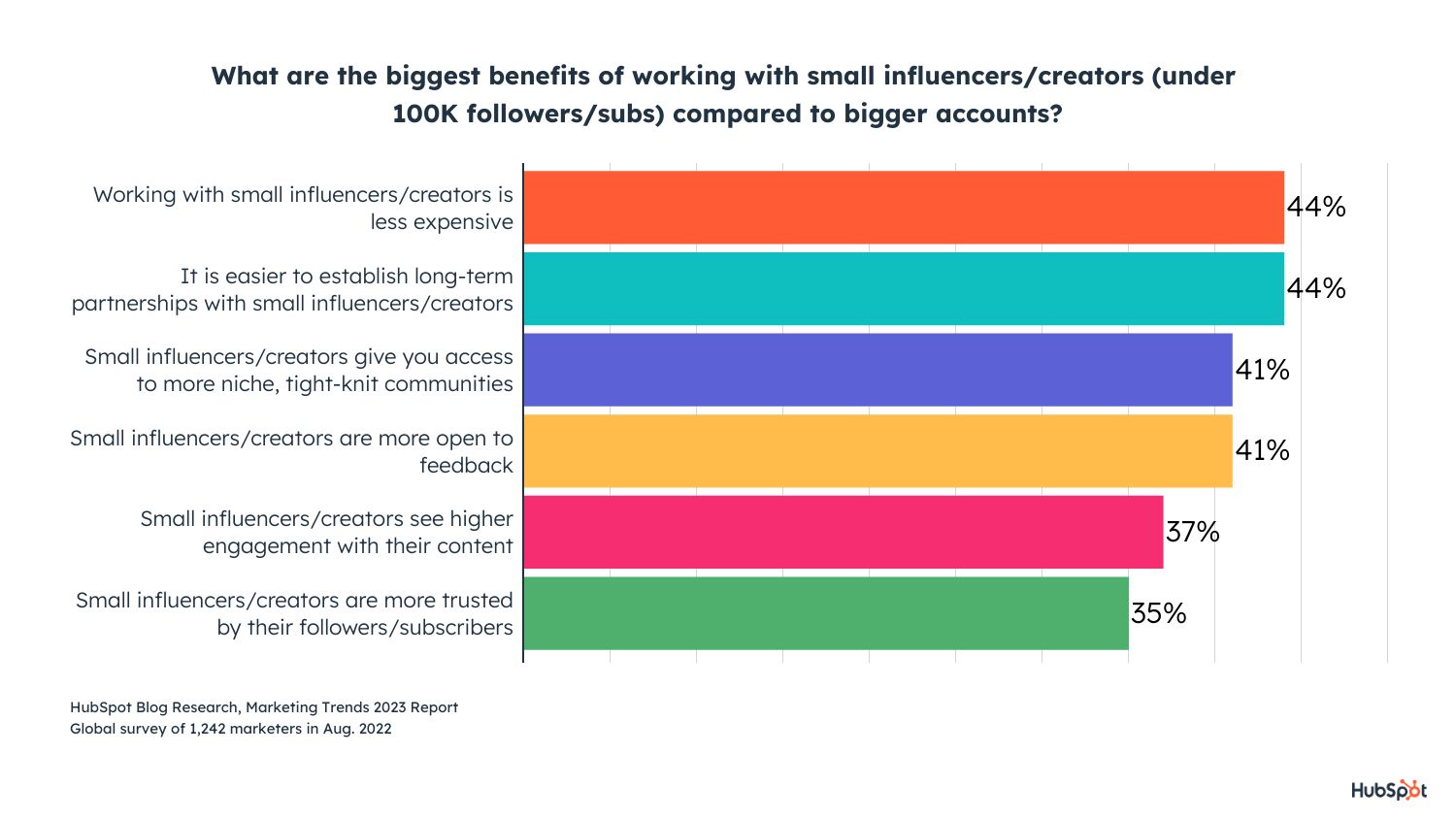
Investing in an influencer marketing strategy in 2023 is a good idea. Social media users often prefer to discover new products through an influencer, and influencer marketing can be an incredibly effective way to increase sales.
Influencer marketing has been proven to be so effective, in fact, that 45% of social media marketers plan to increase their investment in influencer marketing in 2023.
6. Expect high ROI from short-form videos.
Short-form videos (typically considered any video under 60 seconds) have exploded in popularity in recent years.
Consider, for instance, this recent HubSpot YouTube Short video, which achieved over 8K views with just a quick one-minute explainer on Lil Nas X:
Whether your brand chooses to invest in TikTok, Instagram Reels, YouTube Shorts, or another video platform, it’s vital you test out short-form videos for increased engagement.
Short-form videos will grow more than any other trend in 2023, with 32% of social media marketers planning to invest more in short-form videos than any other format.
If you don’t test short-form videos with your audience, you risk losing your audience’s attention before they can convert.
If you aren’t convinced, consider:
- 42% of social media marketers who don’t use short-form video yet plan on trying it for the first time in 2023, the highest of any format.
- 59% of marketers are already using a short-form video plan to increase their investment in 2023, while 39% will continue investing the same amount next year.
- Short-form video is Gen Z and Millennials’ preferred format to learn about new products, so creating short-form videos is also a powerful opportunity to reach Gen Z and millennials.
7. Be relatable and funny with your social content.
People crave content that makes them laugh, and that helps them recognize the real human behind the brand.
When it comes to posting brands on social media, a full 49% of consumers say relatable content is the most memorable for them, followed by funny content (36%).
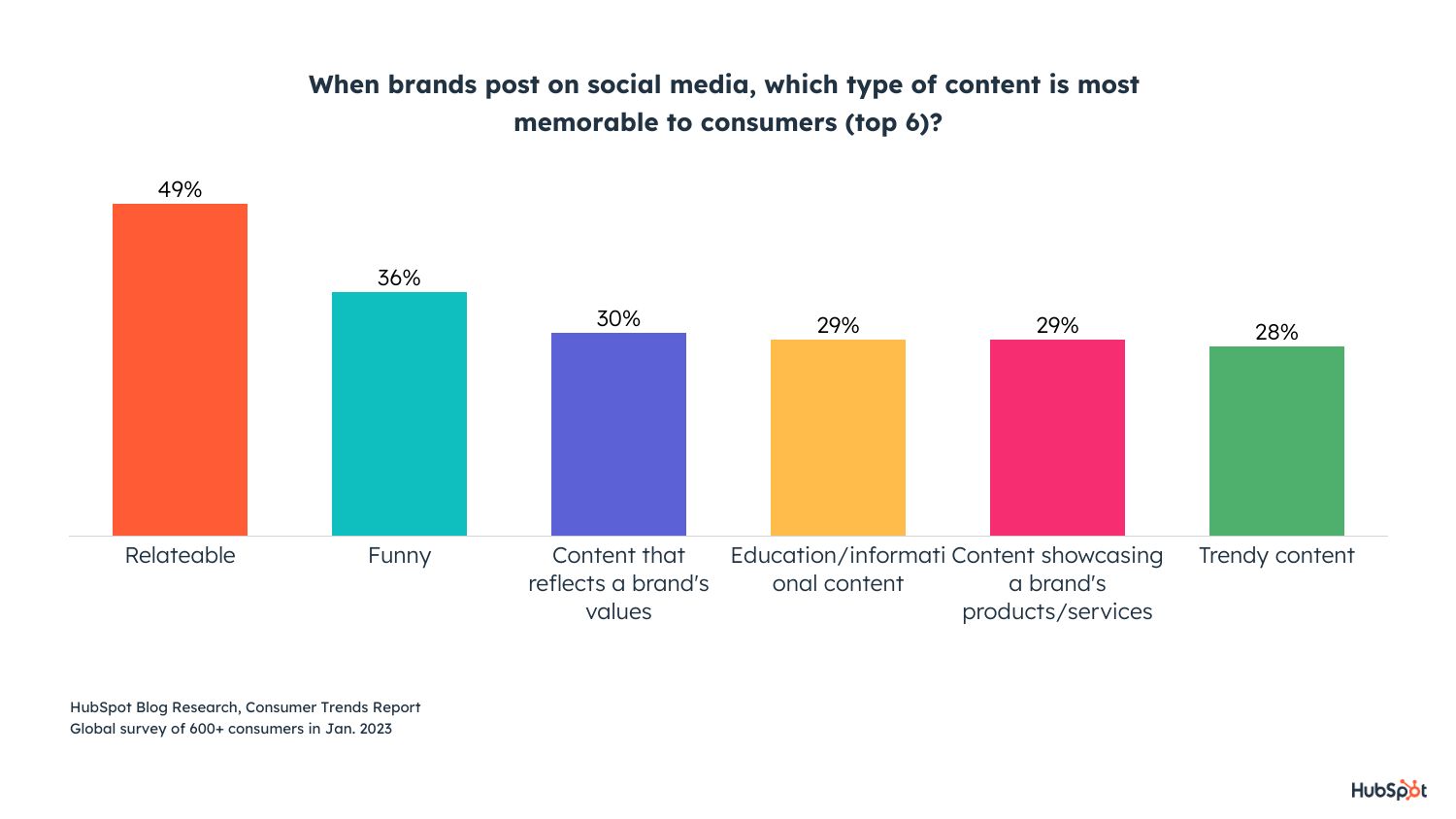
Additionally, 68% of consumers say social media content being authentic and relatable is more important than it being polished with high-production value.
Which is great news for brands: You don’t need to spend thousands of dollars creating polished and highly-edited videos; oftentimes, an iPhone can do the trick.
In 2023, the majority of social media marketers plan to invest heavily in relatable content, and funny content will see the second-most investment of any type of content. To attract new audiences and compete in the space, it’s vital your brand considers how to create authentic and funny posts.
8. Invest in Instagram.
In 2023, Instagram will take the lead when it comes to ROI and engagement, with Facebook tying for highest-quality leads.
Instagram will see the most growth in 2023. In fact, 29% of social media marketers plan to invest more in it than any other platform.
51% of social media marketers using Instagram plan to increase their investment in 2023, while 39% will keep it the same. On top of that, 36% of those who haven’t yet used it plan to leverage Instagram for the first time this year.
All of which is to say: If you haven’t created a dedicated Instagram strategyor you haven’t fully invested time and resources into growing your Instagram following, 2023 is a good year to do so.
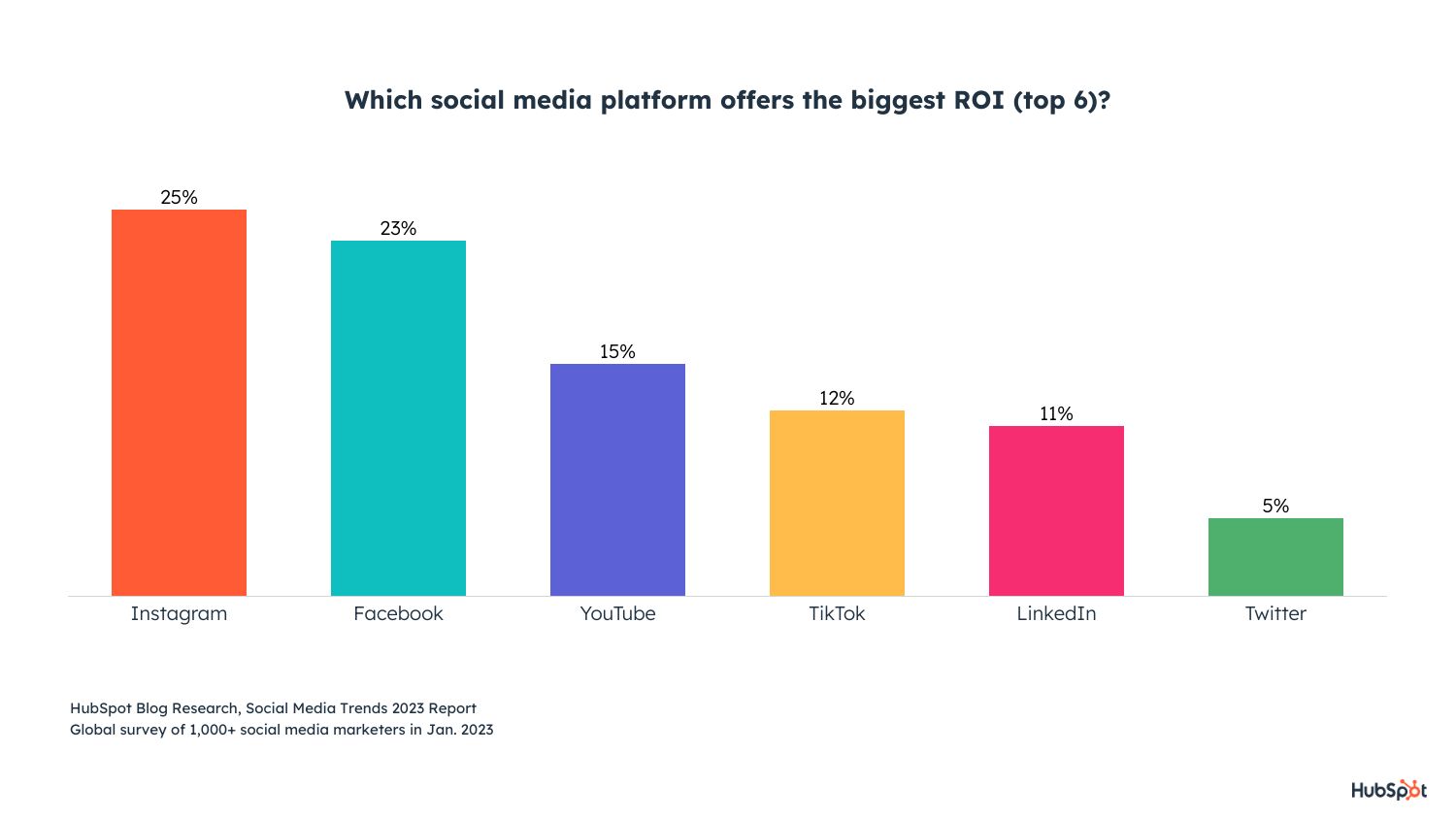
Choose the Insights That Make the Most Sense for Your Brand
Above, we’ve covered the biggest trends and shifts in the social media landscape in 2023 — but that doesn’t mean you need to follow all of them to see tremendous success.
Instead, rely on your own social analytics to determine what your audience craves. Perhaps you find that, despite testing short-form videos, your prospects and customers still click the long-form videos more often. Or, maybe you find that funny content doesn’t work well with your brand voice, and instead choose to invest more heavily in authentic content that matches your brand tone.
You know what’s best for your consumers, but hopefully, these recommendations provide you with the inspiration you need to start testing, iterating, and improving your social strategy for 2023 and beyond.
Interested in learning more about social media in 2023? Click here to set a Google Calendar reminder for the State of Social Media full report, coming February 6.
